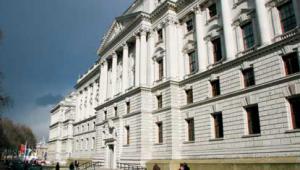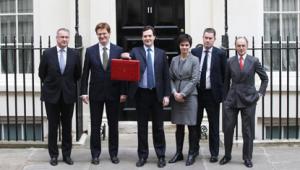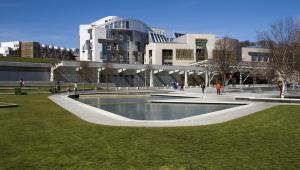In its annual Green Budget report, the economic think-tank warned that it “may prove difficult” to maintain public sector pay increases at 1% a year to 2020 across the whole public sector.
Overall, the IFS said that the chancellor was “boxed in” by his fiscal rules to reach a balance in 2019/20 and for the government to then run a surplus “in normal times” in future.
The provision to run a surplus when there is real gross domestic product growth in the economy of at least 1% was “radically different” from the UK’s previous fiscal rules as it may require big tax rises or spending cuts at very little notice in order to be met, the Green Budget stated.
Like most big economies the UK has only rarely run a surplus – just 8 times in the last 60 years, IFS director Paul Johnson said. The new charter was “much more constraining than Osborne’s previous fiscal rules” and was very inflexible, he added.
“Uncertainty in the fiscal forecasts means that he may well have to cut spending further or raise taxes to get to surplus in 2019/20,” Johnson said.
“With public spending reaching historically low levels relative to national income, promises on tax cuts to keep and pay for, and pressure on revenues from a number of taxes, there may be more tough decisions to come. How he responds to any further unpleasant fiscal surprises may, more than anything we have seen so far, come to define his period as chancellor.”
The fiscal mandate would also, for example, rule out borrowing to invest even where low interest rates mean such investment would be economically beneficial.
The IFS called on government to consider adjusting the rules to allow borrowing for infrastructure investment where it can be demonstrated there will be a financial return to government in the form of revenues – from additional taxes or charges – that will offset the cost of the investment.
Osborne’s plan to get to a surplus in 2019/20 is also dependent on tax revenues rising, largely in response to big tax increases announced since the general election, the Green Budget said, but it noted that tax revenues are volatile and uncertain.
The chancellor has also promised £8bn a year in income tax cuts in the form of a higher personal allowance and an increased higher rate threshold. As these are currently unfunded, delivering them will require equivalent tax rises or spending cuts elsewhere, the review stated.
Overall, public service spending by central government and local authorities is forecast to be cut by 1% in real terms between 2015/16 and 2019/20, according to the Green Budget. This compares with a cut of more than 8% between 2010/11 and 2015/16.












